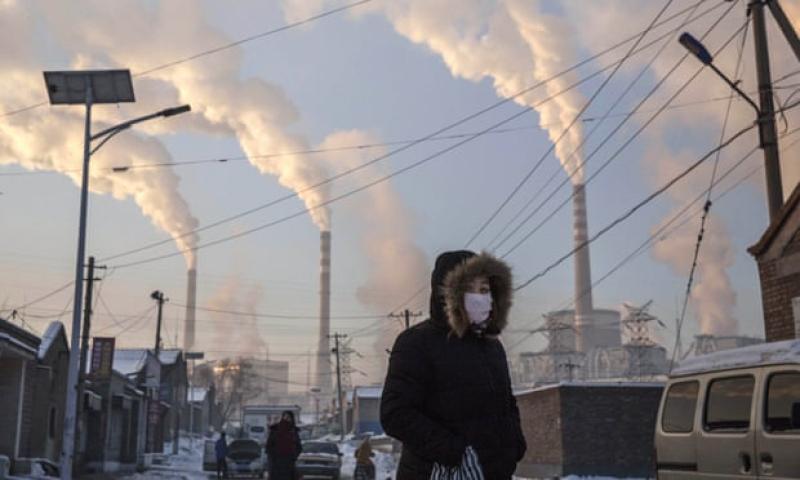Coronavirus could cause fall in global CO2 emissions
By: Jonathan Watts - The Guardian


Facts and data. An unintended consequence of the coronavirus pandemic has been to highlight how economic activity, particularly travel, affects carbon dioxide emissions. And the facts are that transportation has become as large a carbon emitter as electricity generation. Changes in travel behavior demonstrates that it is possible to substantially lower carbon emissions without massive public works projects, financial profiteering, or a drastic reduction in our technological lifestyles.
Unfortunately, achieving a long term benefit from the recent changes in behavior will requiring altering our economic expectations and behaviors, too. Our technological lifestyles need not suffer. But we will need to make changes to our system of generating and distributing income.

Governments should act with the same urgency on climate as on the coronavirus, leading campaigners say, as evidence mounts that the health crisis is reducing carbon emissions more than any policy.
The deadly virus outbreak, which has killed more than 4,000 people and infected more than 116,000, has caused alarm around the world. However, unlike the response to global heating, it has shown how political and corporate leaders can take radical emergency action on the advice of scientists to protect human well being.
In China – the source of the disease and the world’s largest carbon emitter – the actions taken by authorities have inadvertently demonstrated that hefty 25% carbon dioxide cuts can bring less traffic and cleaner air with only a small reduction in economic growth, according to a study by Carbon Brief.
If this trend continues, analysts say it is possible this will lead to the first fall in global emissions since the 2008-09 financial crisis. Even a slowdown in CO2 could buy time for climate action and, more importantly, inspire long-term behavioral changes – particularly in travel.
On the advice of health authorities, millions of people are avoiding school journeys, shopping runs and office commutes. Tens of thousands of flights have been cancelled. Italian bishops are not conducting mass. Across much of central China, factories have been closed, with knock-on effects around the world.
The virus has disrupted several events linked to the fossil fuel industry. In the past few weeks, the Geneva Motor Show was cancelled, after Switzerland banned all public gatherings of more than 1,000 people. In Houston, the giant annual CeraWeek gathering of oil and gas executives was called off, as was the Formula One grand prix in Shanghai.
More carbon savings will come from the cancellations of international conferences. Donald Trump has postponed a 14 March summit with the leaders of the Association of Southeast Asian Nations. The London Book Fair, the Mobile World Congress in Barcelona, the Game Developers Conference in San Francisco, Adobe’s annual live summit and even South by Southwest, the huge annual film, music and media conference in Austin, Texas, have all been called off, which means thousands of tonnes less CO2 from flights taken by international delegates.
The worlds of entertainment, fashion and sport are similarly affected. Stormzy, Mariah Carey, Slipknot and New Order have all cancelled or postponed gigs, though most of the attendees were likely to have been local so the climate impact will be more modest. A bigger effect is likely to come from the postponement of Art Dubai, the biggest art fair in the Middle East. The closure for several weeks of Tokyo Disneyland and Disneysea, or the Universal Studios theme park in Osaka, Shanghai Disneyland and other attractions that usually draw tens of thousands of visitors every day, are also expected to result in fewer flights.
Global air traffic decreased by 4.3% in February with cancellations of tens of thousands of flights to affected areas. But Rob Jackson, the chair of Global Carbon Project, said this would only be meaningful if it led to long-term behavioural change, particularly in aviation, which is one of the fastest growing source of emissions.
“If this could change the way we travel, it could lead to more virtual meetings,” he said. Otherwise, “I see no silver lining to the coronavirus. If gas emissions drop temporarily then great, but it won’t be a meaningful change in the long term unless it shocks us in a global recession. Nobody wanted that in 2008 and nobody wants it now.”
There are encouraging signs. The 189-nation International Monetary Fund and its sister lending organisation, the World Bank, will replace their usual spring gathering in Washington with a virtual teleconference. This is a one-off emergency measure, but the economic and carbon savings could prompt calls for this to become the norm every year.
The question is whether changes are temporary. China’s climate gains – so far estimated at about 200 megatonnes of CO2 – could be short-lived if factories later reopen and crank up production to make up for lost business. President Xi Jinping has indicated the government will provide extra stimulus packages to help the economy recover. Some reports suggest this could prove counterproductive for the climate if this means ramping up coal production or relaxing environmental controls. The last time China suffered a major threat to GDP growth was during the 2008-9 financial crisis. Within a year, extra government spending ensured both the economy and CO2 were back on an upward trajectory.
Analysts say it is too early to know if coronavirus will push global CO2 emissions onto the downward path that is needed if the world is to have any hope of keeping global heating to a relatively safe level of 1.5C above pre-industrial levels. That depends on how far the outbreak spreads, and whether the economic effects are prolonged.
Corinne Le Quéré, professor of climate change science at the University of East Anglia, said that so far the crisis is only likely to slow CO2 growth, not reverse it. “Over the past 10 years, emissions have grown at an annual rate of 1%, or about 317 megatonnes, so you would need a really big reduction to see a fall this year. It’s plausible but I don’t think we can say at this stage.”
But, Le Quéré noted, even a slowdown would gain time for action – advances in technology, lower renewables prices and more public pressure on governments to change tack. The response to the coronavirus could also demonstrate that radical steps can work.
“You can see that when governments see there is an emergency they act straight away with measures commensurate with the threat. That assessment has not yet been made in the case of climate change although governments have declared it an emergency,” she said.
If the outbreak continues, there are concerns that the virus could also force the cancellation of the EU-China summit in Leipzig in September, which would be bad news for diplomatic efforts to build a climate alliance between these two powers.
US author and environmentalist Bill McKibben wrote that no environmentalist should welcome a crisis, but they could learn from it: “Completely apart from the human toll, economic disruption is not a politically viable way to deal with global warming in the long term, and it also undercuts the engines of innovation that bring us, say, cheap solar panels.”
But McKibben is more optimistic about the demonstration that people can change. “It’s worth noting how nimbly millions of people seem to have learned new patterns. Companies, for instance, are scrambling to stay productive, even with many people working from home.
“The idea that we need to travel each day to a central location to do our work may often be the result of inertia, more than anything else. Faced with a real need to commute by mouse, instead of by car, perhaps we’ll see that the benefits of workplace flexibility extend to everything from gasoline consumption to the need for sprawling office parks.”
Tags
Who is online
59 visitors


Consume less, pollute less. Reducing consumption is the fastest and least costly means of reducing carbon emissions. The facts and data speak for themselves. The problem that will need attention to allow adopting that strategy is how incomes are generated and distributed.
Good article. Can we somehow deliver the message to the Chinese government?
I believe China is getting the message. The global profiteers and money chasers are worried about how to get people to consume more, more, more. The emphasis on profits without regard for income is just another method of exploitation. Harvesting the buffalo herds was very profitable until the buffalo were gone.
Now that China has achieved first world status with an economy second only to the US, maybe saving the environment will finally register!
A seed here about Italy's recent air quality improvement is proof of this. .